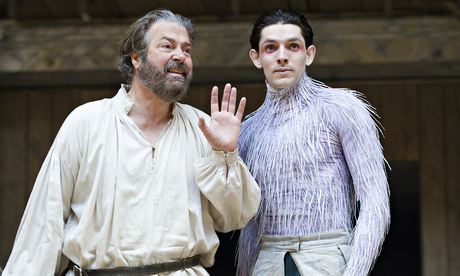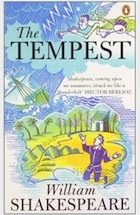Shakespeare's The Tempest: to be read or watched? That is the question
Can dramatic poetry only be fully appreciated on stage, as purists argue - and where do audiobooks fit into the picture?

Stage presence … Roger Allam as Prospero and Colin Morgan as Ariel in The Tempest at Shakespeare's Globe theatre in 2013. Photograph: Tristram Kenton
I discovered the following in my Penguin edition of The Tempest: "He is the greatest of poets, but he is essentially a dramatic poet. Though his plays have much to offer readers, they exist fully only in the performance."
That's a quote from Stanley Wells, the general editor of the entire Penguin Shakespeare series, which I'm assuming appears in every Penguin Shakespeare out there at the moment, and is a pretty brave thing for a man who is supposed to be selling books to say. The implication is that you're better off spending time and money on a performance. A sentiment that has also cropped up in the comments on this month's Reading Group articles.
There is a problem here. Shakespeare's plays are for seeing in performance. Reading them, even for an experienced performer, is heavy going. To read any play with a large cast, it's hard to keep track of who is who and their relationships with each other. Harder still to remember who is in the scene and not saying much. Some people say you can improve things with a chess board and named pieces and lots of different voices. Reading a play aloud in an upstairs pub room would be even better but not what we have here.
Naturally, as the convener of the "Reading" Group I'm inclined to defend the text. Although, I don't want to do the theatre down. Actually, who am I kidding? I do want to do the theatre down. Several of the longest and most miserable hours of my life have been spent in the theatre. If it isn't the histrionics on the stage, it's the mock hysterical laughter in the audience as upper middle class men with hawing voices loudly let you know they've UNDERSTOOD THE JOKE.
Anyway. In spite of the fact that it isn't as good as television, theatre does still have plenty to offer. A good performance can bring a play to wonderful joyous life, wring out deep emotions and change and enrich your view of the text. I know all that. It can also, more simply, be fun.
The first thing I did to reacquaint myself with The Tempest this month was download the Naxos audiobook, starring Ian McKellen as Prospero. I loved it – and a good deal of the pleasure was thanks to the quality of the acting. Caliban was full of brute energy. Trinculo and Stephano's drinking scenes made me splutter with (yes, middle class) laughter – and it's no mean feat to make a 400-year-old joke fun. Ian McKellen was, as you might expect, delightful. He recorded the part shortly after filming for The Two Towers and sounds as if he is relishing the opportunity to do posh-Gandalf. Like his Middle-earth counterpart, this Prospero can growl menace, but essentially displays a benevolent heart. When he expresses affection for Ariel and tells him he'll miss him, for instance, it's genuinely moving. You can feel his love and regret. Even through headphones, while walking back from the school run, I felt a pang. Ian McKellen's Prospero is, in short, a force to be reckoned with.
Although, of course, it remains Ian McKellen's Prospero. Possibly not Shakespeare's – and certainly not mine. The big advantage that comes from actually reading a Shakespeare play is that it leaves each character open to interpretation. There's nothing wrong with McKellen's essentially nice guy – but nor is there a problem with seeing darker hues in Prospero, and thinking there's some justification when Caliban calls him "a tyrant, a sorcerer, that by his cunning hath cheated me of the island".
Likewise, I remember clearly the first time I read the play, aged 17, I took a dim view of Prospero's attempts to dictate the course of his daughter's life. Now, although I still have serious doubts about his aims and methods, I also have more sympathy for a man doing his best to protect his little girl and help her on her way into the world. I was right to see him as a bad dad. I'm also right to see him as someone trying to be a good one.
Such variable interpretations are also available line by line. Take for instance, one of the most famous exchanges in the play:
Miranda:
O wonder!
How many goodly creatures are there here!
How beauteous mankind is! O brave new world,
That has such people in't!
Prospero:
'Tis new to thee.
Is Prospero mocking his daughter, or sympathising? Is he laughing or annoyed? Does he speak the line direct to her, to chide her? Or does he mutter it to himself, in weariness? Or spit at the audience, to underline her ignorance? Does he share her joy in this new world? Or is he saying that what she sees as new is all too old to him? Admittedly, some of those possibilities are more likely than others – but all are there, and the ambiguity is part of what makes the text so delicious.
Of course, reading Shakespeare isn't all joy. Not at first, anyway. I'd be lying if I tried to pretend that I understood every word of that audiobook, and while listening undoubtedly made some passages go down easier, I also missed plenty. Plenty of lines need more than one reading – you can't get past a few without the help of an editor.
And then, there's also the fact that many just have to be savoured:
Our revels now are ended. These our actors,
As I foretold you, were all spirits, and
Are melted into air, into thin air:
And like the baseless fabric of this vision,
The cloud-capp'd tow'rs, the gorgeous palaces,
The solemn temples, the great globe itself,
Yea, all which it inherit, shall dissolve,
And, like this insubstantial pageant faded,
Leave not a rack behind. We are such stuff
As dreams are made on; and our little life
Is rounded with a sleep.
Okay, okay, I can see the advantage of hearing that in the theatre. But you get my point.

沒有留言:
張貼留言